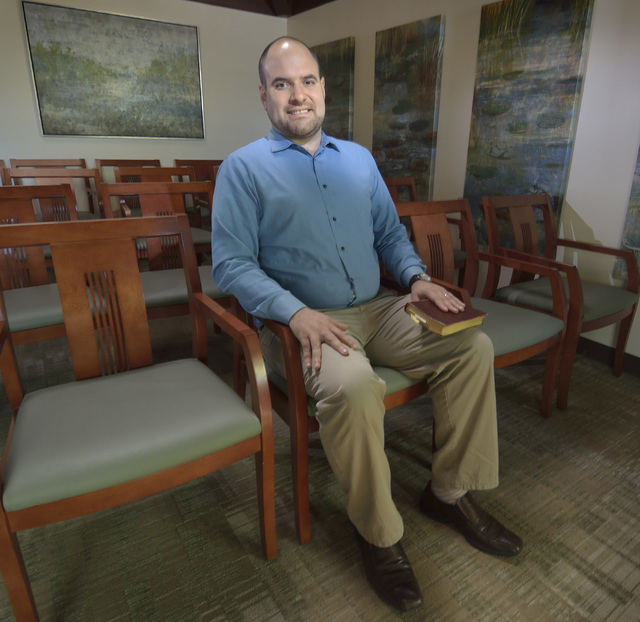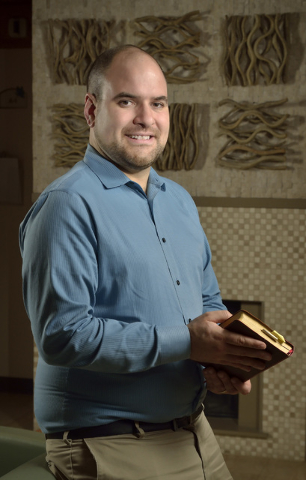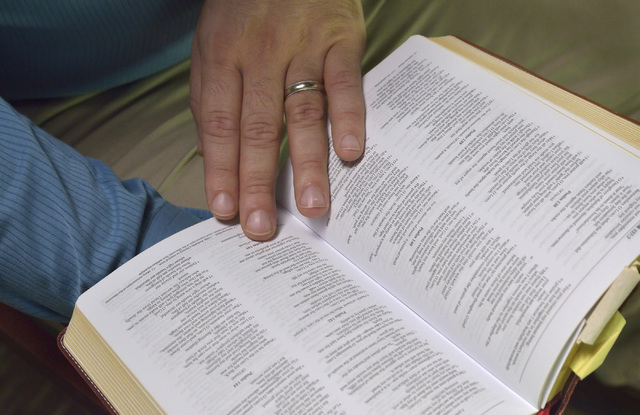Hospice chaplains listen, support rather than preach
When someone receives the diagnosis of a terminal illness, it can be catastrophic for both the patient and the family. Among the options for end-of-life care is hospice.
“Hospice cares for body, mind and spirit,” said Chaplain Matt Matevelis, spiritual supervisor at Nathan Adelson Hospice. He is on the assessment team for all levels of care, and oversees five staff chaplains and 12 volunteer chaplains. “Hospice is a philosophy of care. We are there for spiritual support and emotional support before and after the death. And for some we are just a companion who is willing to listen.”
Nathan Adelson Hospice is a nonprofit organization that has been serving families in Las Vegas for 35 years. There are also 40 privately owned hospices in the valley.
Every person diagnosed with a life-limiting illness can apply to Nathan Adelson Hospice. Patients can be admitted to one of its two facilities, with 38 patient beds.
Or they can be served in nursing homes or their own homes. Every team includes medical professionals, a social worker and a chaplain.
Spiritual care is different for each patient. “People make assumptions that we assess their depth of faith. That is not true,” Matevelis said. “We act as companions who support and help them find peace, however they define it. I never speak of my own beliefs unless they ask.”
The chaplains serve all faiths. “We have outside sources for specific faiths. I have also provided support for people who identify as agnostic or atheist, they have their own spiritual pathway.”
He will always remember one patient who was a “fire breathing atheist,” he said. “He always talked about what a scam and fraud religion is. But we always had a wonderful time. I enjoyed getting to know him, he was a great man.”
He also spoke of a patient he visited in a nursing home. “Every time I walked by he would ignore me, or hide his head under the blankets. It was a desperate struggle to reach him.
“But one day I went into his room and the nurses were changing his roommate’s bed pan. The stench was so horrible one of the nurses asked if I wanted to leave the room. But I said, ‘If my patient has to smell this, then I can, too.’
“The patient looked at me with a little smile, and after that he was open to visits. We even discovered we had similar interests.”
Matevelis said he has received many blessings in his position. Patients and families sometimes want to learn more as death approaches. “We had an administrator once who said it’s like they’re cramming for their final exam,” he said.
Volunteer chaplains also meet directly with patients and families. Jim Silva has been working in pastoral care in nursing homes for many years and is also a chaplain at High Desert State Prison.
“I was led by the Lord to start working with hospice patients. It’s a great fit for the organization and for me,” he said. “I do a lot of listening, and keeping them company, but if they question God or the Bible I will answer.
“It is sad seeing people suffering at the later stage of life, but it is also rewarding. My role is working with patients in the facility who maybe have one or two weeks left.”
Zullie Franco is another volunteer chaplain and the only one who is bilingual. She has worked with pastors in need, and also ran a community center for Hispanic-Americans. In 2012, she received a call from Nathan Adelson Hospice to help patients and loved ones, especially Hispanics.
“I have never seen this level of suffering and anguish,” she said. “I help families who require skilled reflection. They are never prepared for the terminal diagnosis and I can provide spiritual care.”
One area of her work is especially difficult, “when the patient is a child. It is difficult for everyone to adjust to the situation and to accept the realities. The siblings suffer as well as the parents.”
She describes a terminal diagnosis like a bomb exploding in the family. “Everything crumbles and it’s so hard for them to accept the reality. Nothing is ever the same,” she said.
Franco also helps after the patient dies. “There are a lot of phone calls and there are still many areas we can help.”
Nathan Adelson Hospice also provides support groups that are open to everyone, not just for patient families. “We help everyone in grief. The support groups are confidential, respectful and private. Families feel safe talking about their feelings and sharing with others,” she added.































